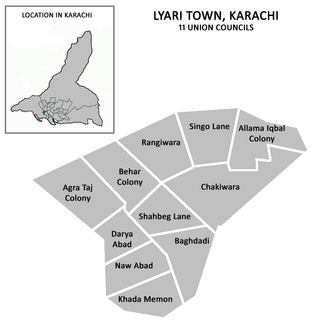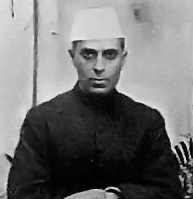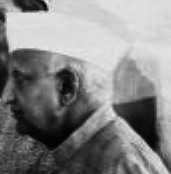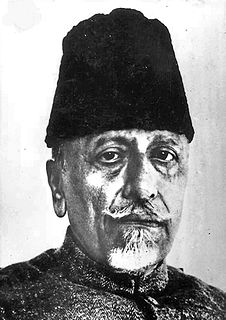| |||||||||||||
| |||||||||||||
 | |||||||||||||
Elections to the Legislative Assembly of Sind were held in January and February 1937. [1] These were the first elections in the province after its creation in 1936. The Communal Award of 1932 had allocated sixty assembly seats to Sind, based on which it now formed an assembly of its own. [2]
The Communal Award was made by the British prime minister Ramsay MacDonald on 16 August 1932 granting separate electorates in India for the Forward Caste, Scheduled Caste, Muslims, Buddhists, Sikhs, Indian Christians, Anglo-Indians, Europeans and Depressed Classes etc. The principle of weightage was also applied. Sir Samuel Hoare asked for clarification of the ninth and last paragraph that applied directly to the Depressed Classes. The Award favoured the minorities over the Hindus causing consternation and eliciting anger from Gandhi. From the fastness of Yeravda Jail he made contact with the Cabinet in London declaring on 4 January 1933 an open fast until death.
The seats were divided amongst the following electoral colleges; Muslims Rural 31 seats, Muslims Urban 2 seats, Women Muslim Urban 1 seat, General Rural 15 seats, General Urban 3 seats, Women General Urban 1 seat, Europeans 2 seats, Landowners 2 seats, Commerce and Industry 2 seats and Labour 1 seat. [2] In total, there were 639,043 eligible voters. [1]
The Sind United Party won twenty-two of the Muslim seats, the Sind Muslim Political Party won four seats 4 whilst the Sind Azad Party won three seats. The party identity of one Muslim delegate was unclear. Independent candidates won the remaining nine seats from the Muslim constituencies. [1]
The Sind United Party or Sind Ittehad Party was a political party in Sind, British India. The party was founded in June 1936, the same year that the Sind province had been created. The party was modelled on the Punjab Unionist Party. The party had as its explicit purpose to foster communal harmony between Hindus and Muslims. Haji Abdullah Haroon was a co-founder and leader of the party. Shah Nawaz Bhutto was the vice chairman of the party. G. M. Syed had also taken part in the founding of the party. The party counted on the support of waderas, such as Allah Bux Soomro and Yar Muhammad Junejo. The Sind Ittehad Party opposed the partition of India. Bux stated:
Whatever our faiths we must live together in our country in an atmosphere of perfect amity and our relations should be the relations of the several brothers of a joint family, various members of which are free to profess their faith as they like without any let or hindrance and of whom enjoy equal benefits of their joint property.
The Sind Azad Party was a political party in Sindh, India. The party was founded by Sheikh Abdul Majid Sindhi in Karachi on August 18, 1932.
In the General constituencies, the Sind Hindu Mahasabha won eleven seats, the Congress Party eight seats, Independent Hindus two seats and Independent Labour Party one seat. From the European and Commercial and Industry constituencies, non-party candidates were elected. [1]

The Indian National Congress(
However, whilst the Sind United Party had emerged as the winner of the election its two most prominent leaders (Haji Abdullah Haroon and Shah Nawaz Bhutto) had failed to win the seats they contested. [2] Haroon had contested the Lyari constituency, in northern Karachi. The Lyari seat was won by Sardar Allah Baksh Gabol. The Larkana seat, which Bhutto had contested, was won by Sheikh Abdul Majid Sindhi. [1]
Khan Bahadur Sir Shah Nawaz Bhutto,, CIE, OBE, was a politician and a member of Bhutto family hailing from Larkana in Sindh province of British India, which is now part of Pakistan.

Karachi (Urdu: کراچی; ALA-LC: Karācī, IPA: [kəˈraːtʃi]; is the capital of the Pakistani province of Sindh. It is the most populous city in Pakistan, and fifth-most-populous city proper in the world. Ranked as a beta-global city, the city is Pakistan's premier industrial and financial centre. It is the cultural, economic, philanthropic, educational, and political hub of the country, and Pakistan's most cosmopolitan city. Situated on the Arabian Sea, Karachi serves as a transport hub, and is home to Pakistan's two largest seaports, the Port of Karachi and Port Bin Qasim, as well as Pakistan's busiest airport, Jinnah International Airport.

Larkana is a city in the north-west of the Sindh province of Pakistan, where the historic Indus River flows in south of the city. It is called the city of Holy Alams due to the greatest number of Holy Alams as compared to other cities or regions of the world. It is home to the Indus Valley Civilization site Mohenjo-daro. It is the 15th Largest city of Pakistan.
After the election the governor of Sind asked the leader of the Sind Muslim Political Party to form a cabinet. Largescale defections took place from the ranks of the Sind United Party and the Sind Azad Party in the assembly. [2]
United Party senior leader Allah Bux Soomro later served as Premier of Sindh from March 23, 1938 – April 18, 1940 until a no-confidence motion was passed against him by the Indian National Congress and Muslim League. [3] He was briefly elected back to power and served briefly from March 27, 1942 – October 14, 1942, but was dismissed by the Governor due to his support for the Quit India Movement. [3]









